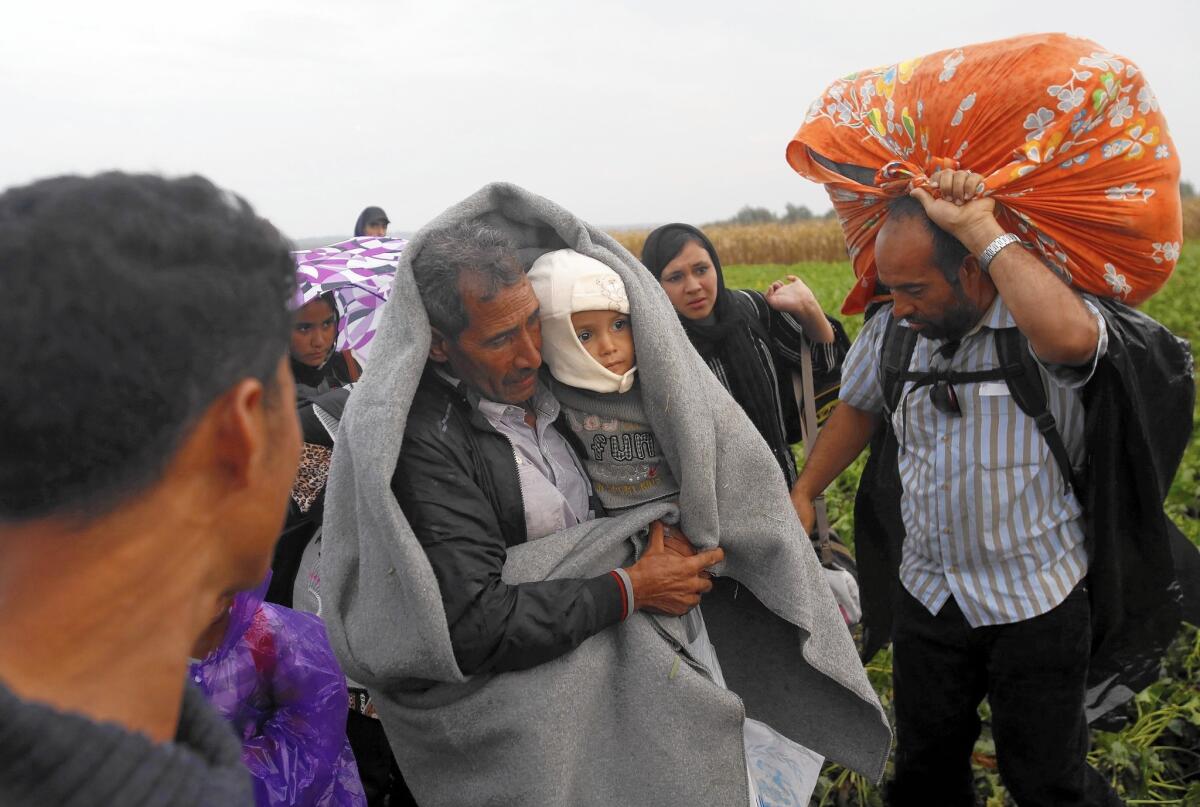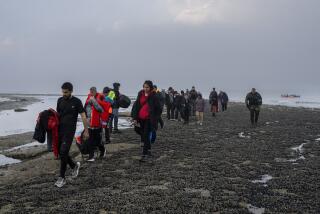In Serbia, migrants are in limbo as they await word of next open border

- Share via
Reporting from BELGRADE, Serbia — Before they left Turkey, the friends made a pact: no smugglers. If they were going to get to Europe, they would do it on their own.
The five young Syrians pooled their money and bought a motorized raft for $2,400 that was just big enough to fit all of them. Early one morning in September, they picked the shortest route between the west coast of Turkey and the nearby Greek island of Lesbos and set off, safely navigating rough waters that have claimed the lives of other migrants.
Once in Greece, the buddies followed the well-worn path of refugees and migrants who have been pouring into Europe by the thousands each day, taking the bus, crowding onto trains and walking through Greece and Macedonia to Serbia.
But here in Belgrade, the Serbian capital, they found themselves at sea again — figuratively, at least. Caught up in Europe’s squabbling on how to deal with its largest migration of people since World War II, the men were in limbo, unable to figure out how to proceed to their preferred destinations in Northern Europe.
In recent weeks, border openings and closings have happened so rapidly in the Balkan states of Serbia, Croatia and Slovenia and in nearby Hungary that new arrivals in Belgrade, a common staging post on the migrant trail, have no idea what to do next. Travel plans carefully laid weeks ago have fallen apart. Information is short-lived and contradictory, turning Europe into a confusing chessboard for asylum seekers trying to plot their next move.
“We have a bus ticket to the Croatian border, but we don’t know what will happen,” said Ali, one of the five friends, who declined to give his last name because his parents still live in their war-torn homeland.
He and his companions hail from Homs, a city devastated by violence. Trained as a software engineer, Ali, 24, was aiming for the Netherlands, where he wants to enroll in a master’s program.
“I don’t understand why they are changing all the logistics each time, shuttling us from one border, telling us to walk across the next one,” he said of various Balkan authorities. “Why not just let us go through to the countries that say they will accept us?”
Such bewilderment is common in the makeshift migrant camp erected during the spring in a downtown park next to Belgrade’s central bus station, where hundreds of journeying asylum seekers remain stuck in a holding pattern.
Dozens of tents dot the camp’s square. In between, tired young men curl up on pieces of cardboard, trying to catch a few hours of sleep. Children play in the dirt with donated stuffed animals and balls as their mothers watch or cradle infants. Their fathers search for places to receive money via Western Union.
NEWSLETTER: Get the day’s top headlines from Times Editor Davan Maharaj >>
In the middle of the park sits a volunteer information booth from which electrical power strips snake to a bench outside. Every socket is taken up by a recharging cellphone.
The same question hovers on everyone’s lips: Where is the next open border?
To the west, Croatia, overwhelmed by tens of thousands of asylum seekers, shut all border crossings with Serbia for several days. That sparked angry exchanges between the two countries, which went to war with each other in the 1990s. The crossings have since reopened, but this week the Croatian prime minister declared he no longer wanted to speak to his Serbian counterpart.
To the north, Hungary has erected a razor-wire-topped fence along its nearly 110-mile border with Serbia and made it a criminal offense to cross illegally. Yet Hungarian authorities also continue to shuttle some migrants and refugees coming from Serbia over to Austria.
In Belgrade, migrant help centers overflow with donated diapers, food and blankets, but can’t dispense the most sought-after commodity: advice on what will happen at the next frontier.
“Information is changing every day, and it’s very difficult for us to tell them where they can go next,” said Milos Rajkovski, a volunteer at a help center near the main railway station. The center is supported by the United Nations’ refugee agency and several local charities.
“Even I have a hard time figuring out what’s going on from the news,” Rajkovski said. “I just have to tell them I don’t know.”
Migrants come to the center to use computers to check the latest news on Facebook pages created by refugee and volunteer groups. The more affluent asylum seekers spend their money on hotels and on taxis to and from border crossings where they try their luck. Those who can’t afford to do so camp out, waiting for more certain information even as the weather turns chilly and the rain turns the earth beneath them into mud.
The Serbian government has set up an official migrant camp across the Danube River from central Belgrade, but virtually no one wants to go there.
“They don’t have proper accommodation in that camp, and they need papers to enter the camp,” which many migrants lack, said Rados Djurovic, director of the nonprofit Asylum Protection Center in Belgrade.
The migrants are also loath to be far from a main road or transit hub because that would prevent them from moving quickly if a window for getting into Croatia or Hungary suddenly opens, Djurovic said.
On a recent afternoon, 22-year-old Ahmad Khalifa watched as another migrant approached his group of 17 travelers. Khalifa, from the besieged eastern Syrian city of Dair Alzour, quickly pounced.
“What do you know about the Croatian border?” he asked the stranger, who had no concrete information to offer.
Khalifa and his group had arrived in Belgrade that morning, before sunrise. They had run out of money and were anxiously awaiting a wire transfer of funds from Khalifa’s uncle in Germany to finance the rest of their way there.
If trying to exit Serbia openly and legally remained a crapshoot, Khalifa said he would resort to clandestine means.
“If we have to pay smugglers, we will,” he said. “There’s always a way over a border.”
Special correspondent Ayres reported from Belgrade and Times staff writer Chu from London.
ALSO
Afghan forces retake Kunduz from Taliban, government says
Peru protesters lift blockade at China-funded mine in hope of talks
Fleeing Syria: A aother’s wrenching choice
More to Read
Sign up for Essential California
The most important California stories and recommendations in your inbox every morning.
You may occasionally receive promotional content from the Los Angeles Times.











